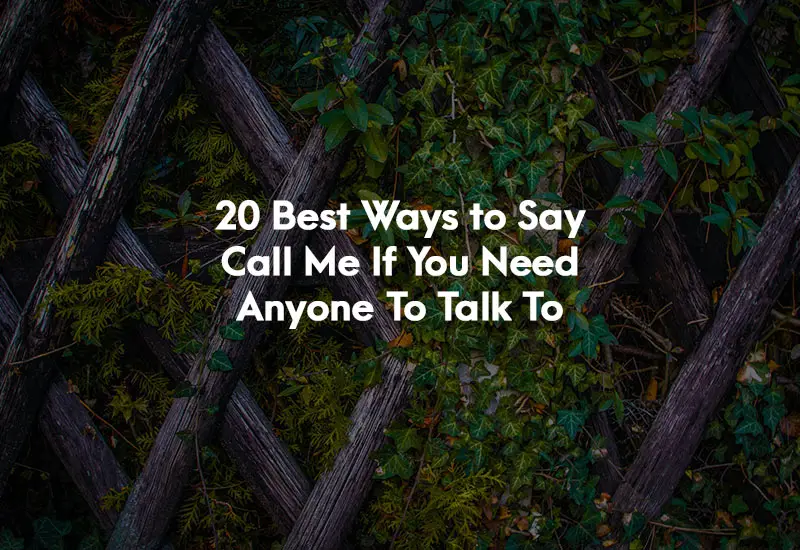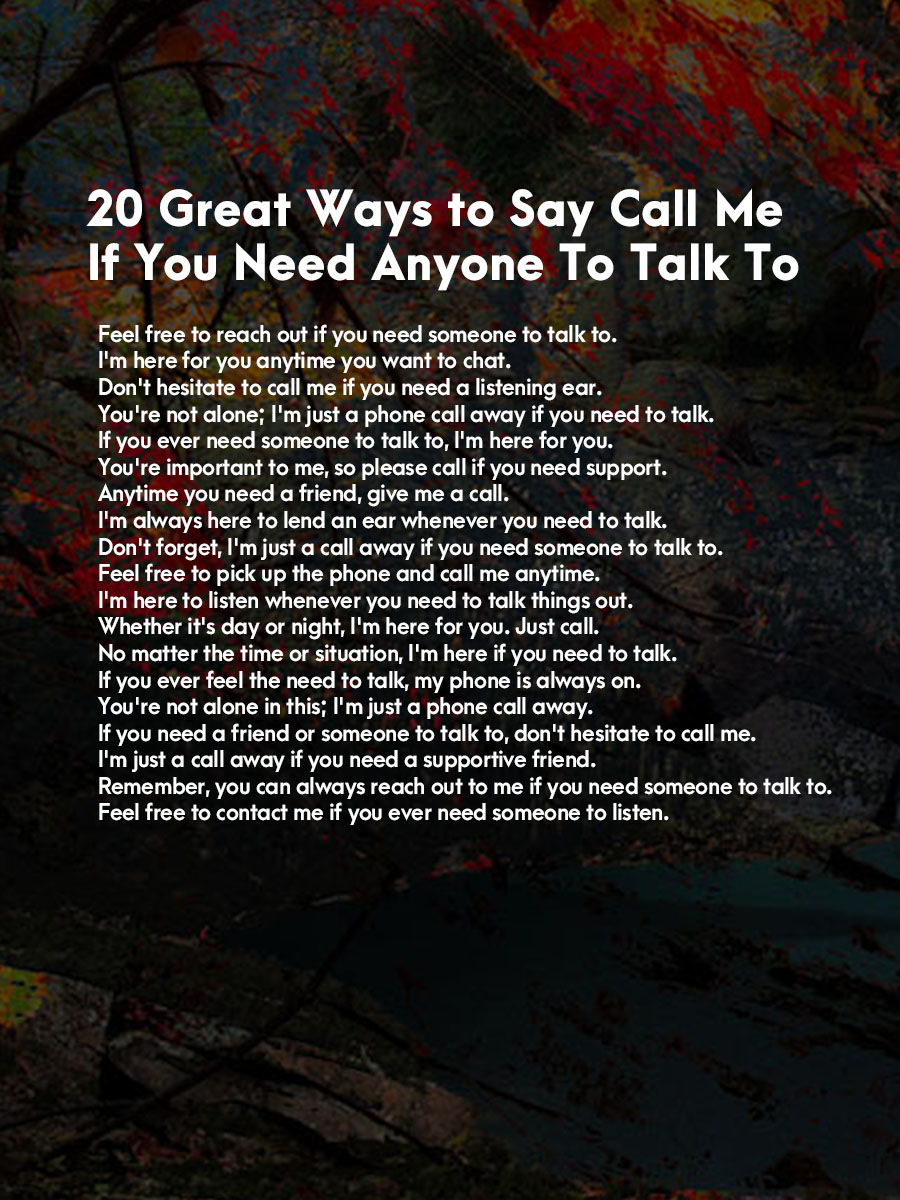Looking for someone to talk to? Sometimes we all need a listening ear. In this blog post, we’re exploring the best ways to let your friends and loved ones know they can reach out to you when they need someone to talk to. Whether it’s a tough day or just a chat, we’ll cover simple and effective ways to express your availability and support. Let’s dive into ways to offer comfort and be there for those who might need it.

20 Great Ways to Say Call Me If You Need Anyone To Talk To
- Feel free to reach out if you need someone to talk to.
- I’m here for you anytime you want to chat.
- Don’t hesitate to call me if you need a listening ear.
- You’re not alone; I’m just a phone call away if you need to talk.
- If you ever need someone to talk to, I’m here for you.
- You’re important to me, so please call if you need support.
- Anytime you need a friend, give me a call.
- I’m always here to lend an ear whenever you need to talk.
- Don’t forget, I’m just a call away if you need someone to talk to.
- Feel free to pick up the phone and call me anytime.
- I’m here to listen whenever you need to talk things out.
- Whether it’s day or night, I’m here for you. Just call.
- No matter the time or situation, I’m here if you need to talk.
- If you ever feel the need to talk, my phone is always on.
- You’re not alone in this; I’m just a phone call away.
- If you need a friend or someone to talk to, don’t hesitate to call me.
- I’m just a call away if you need a supportive friend.
- Remember, you can always reach out to me if you need someone to talk to.
- Feel free to contact me if you ever need someone to listen.
Why Reach Out To Someone
It is often said that a problem shared is a problem halved. When we find ourselves struggling or feeling overwhelmed, it can be incredibly helpful to reach out to someone we trust and let them know what’s going on. Not only does reaching out provide a much-needed release valve for our emotions, but it also offers a range of other benefits that can greatly improve our well-being.
Reduce Stress And Anxiety
When we keep our worries and concerns to ourselves, they tend to multiply and become more overwhelming. By reaching out to someone we trust and sharing our thoughts and feelings, we can significantly reduce the burden of stress and anxiety that we carry. Just the act of verbalizing our concerns to another person can provide immense relief and help us gain much-needed clarity in navigating whatever challenges we may be facing.
Gain Different Perspectives
Our own thoughts and perspectives can sometimes become limited, leading us to a narrow understanding of our problems. When we reach out to someone for support and share our situation, we invite the possibility of gaining different perspectives. Through their experience, knowledge, and wisdom, our trusted confidant can offer fresh insights and alternative solutions that we may not have considered on our own. This can open up new pathways and help us approach our challenges with a broader perspective.
Emotional Support
One of the most significant benefits of reaching out to someone is the emotional support we receive. Knowing that we have someone who is there to listen, understand, and empathize with our struggles can be incredibly comforting. Having a safe and non-judgmental space to voice our emotions allows us to acknowledge and process them effectively. This emotional support can bolster our resilience and provide the encouragement we need to face and overcome our difficulties.
Reaching out to someone is not a sign of weakness, but rather a testament to our strength and willingness to seek the help and support we need. We all experience challenges and emotions that can be difficult to bear alone, and by reaching out, we allow ourselves to share the load and find solace in the understanding and support of others.
The Importance Of Mental Health Support
Mental health support is crucial for overall well-being and quality of life. Here are some key factors to consider when it comes to the significance of seeking mental health assistance.
Recognizing The Need For Help
The first step toward seeking mental health support is recognizing the need for help. It's okay to acknowledge the struggles you are facing and understand that professional assistance can provide valuable guidance and support.
Breaking Down Stigmas
Breaking down stigmas surrounding mental health is essential for individuals to feel comfortable seeking assistance. By challenging stereotypes and promoting open discussions, we can create an environment where people feel empowered to prioritize their mental well-being.
Building Stronger Relationships
Seeking mental health support can also contribute to building stronger relationships. By addressing mental health issues, individuals can develop a deeper understanding of themselves and others, leading to stronger, more supportive connections.
Ways To Offer Support
Looking for someone to talk to? I’m here for you. Reach out anytime and I’ll lend an understanding ear.
Listening With Empathy
In challenging times, practicing empathy by actively listening without judgment can create a safe space. Offering your full attention demonstrates care and understanding.
Providing Validation And Reassurance
Validating someone’s feelings by acknowledging their emotions and reassuring them that they are not alone can foster a sense of comfort and support in difficult moments.
Offering Practical Advice
Suggesting actionable steps or solutions that could help alleviate the situation can empower the person to take positive actions for their well-being.
Sharing Personal Experiences
Sharing personal stories of overcoming similar struggles can show empathy and solidarity, letting the person know they are not the only one facing challenges.
Encouraging Professional Help
Encouraging the individual to seek professional support or therapy when needed can be a crucial step in ensuring they receive the appropriate level of care and assistance.
Effective Communication Techniques
Effective communication is crucial when providing support to someone in need. These techniques can help in fostering a deeper connection and understanding:
Active Listening
Engage fully to understand their perspective and emotions.
Non-judgmental Attitude
Show empathy and refrain from passing judgment on their feelings.
Using Open-ended Questions
Encourage them to express their thoughts freely.
Reflecting Emotions
Repeat and validate their feelings to show you understand.
Avoiding Interruptions
Give them space to talk without interruptions.
Creating A Safe And Supportive Environment
Confidentiality And Trust
Confidentiality and trust are the cornerstones of a safe and supportive environment. Assure individuals that their conversations will remain private, building a foundation of trust that encourages them to open up without fear of breach. Be clear about the boundaries, and maintain confidentiality at all costs.
Practicing Non-threatening Behavior
Engage in non-threatening behavior to convey a welcoming and non-judgmental atmosphere. Stop interrupting or imposing your opinions. Demonstrate active listening through body language, such as making eye contact and maintaining an open posture, to show that their thoughts and feelings are being valued.
Being Patient And Respectful
Patience and respect are crucial in creating a safe and supportive environment. Practice patience, allowing individuals to share at their own pace without feeling rushed. Acknowledge their feelings and experiences with respect, validating their emotions and providing a shoulder to lean on without judgment.
Showing Genuine Care And Concern
Express genuine care and concern. Show empathy and compassion, providing comfort and reassurance to those in need of someone to talk to. Be attentive to their needs and offer support without hesitation, fostering a sense of security and understanding.
Ensuring Availability
Make yourself available to those seeking support. Assure individuals that you are there for them whenever they need to talk, creating a reliable support system that offers a sense of safety and security. Maintain an open line of communication, ensuring that they feel heard and supported.

More Ways to You Can Say
- If you ever need a friendly voice, don’t hesitate to ring me up.
- Whenever you need a sympathetic ear, I’m just a phone call away.
- Feeling overwhelmed? Reach out anytime for a chat.
- You’re not alone in this. Call me if you need a listening ear.
- If you’re feeling down, remember you can always call me.
- Don’t bottle things up. Feel free to call me whenever you need to talk.
- Need to unload your thoughts? I’m here to listen whenever you’re ready.
- No matter the hour, don’t hesitate to give me a call if you need someone to talk to.
- I’m here to support you. Reach out anytime you need to talk.
- You’re important to me. Call me anytime you need a friend.
- Feeling stressed? Give me a call and we can talk it out.
- Don’t suffer in silence. I’m here to lend an ear whenever you need it.
- If you need to vent or share, know that I’m here to listen.
- Need a shoulder to lean on? I’m just a phone call away.
- Whenever life gets tough, remember I’m here for you. Call me anytime.
- If you need someone to talk to, don’t hesitate to pick up the phone.
- Don’t hesitate to reach out if you need some support. I’m here.
- Whether it’s day or night, I’m here to listen whenever you need.
- You’re not bothering me. Feel free to call whenever you need to talk.
- If you need a friend, don’t forget you can always call me. I’m here to listen.
Conclusion
Remember, reaching out for support is a sign of strength, not weakness. Whether it’s a friend, family member, or mental health professional, there are people who care about you and want to help. You don’t have to navigate your struggles alone.
Take the first step and make that call. You deserve to be heard.









